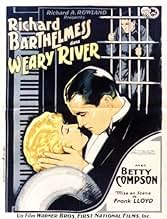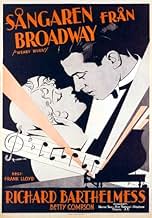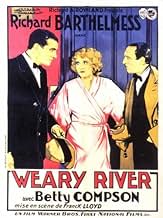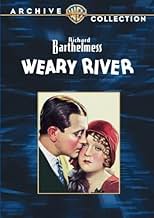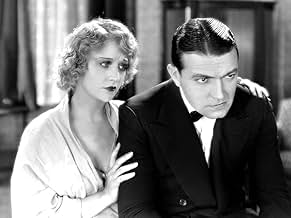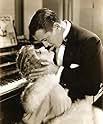अपनी भाषा में प्लॉट जोड़ेंA gangster is put in prison, but finds salvation through music while serving his time. Again on the outside, he finds success elusive and temptations abound.A gangster is put in prison, but finds salvation through music while serving his time. Again on the outside, he finds success elusive and temptations abound.A gangster is put in prison, but finds salvation through music while serving his time. Again on the outside, he finds success elusive and temptations abound.
- 1 ऑस्कर के लिए नामांकित
- 2 जीत और कुल 1 नामांकन
George E. Stone
- Blackie
- (as George Stone)
Ray Turner
- Elevator Boy
- (as Raymond Turner)
Ernie Adams
- Ex-Con in Alley
- (बिना क्रेडिट के)
Brooks Benedict
- Jerry's Guest
- (बिना क्रेडिट के)
Ruth Cherrington
- Actress Backstage Who Locks Her Door
- (बिना क्रेडिट के)
James Conaty
- Attorney at Trial
- (बिना क्रेडिट के)
Richard Cramer
- Prison Radio Announcer
- (बिना क्रेडिट के)
Oliver Cross
- Restaurant Patron
- (बिना क्रेडिट के)
Edwards Davis
- Prison Chaplain
- (बिना क्रेडिट के)
Sally Eilers
- Hatcheck Girl
- (बिना क्रेडिट के)
Jim Farley
- Plainclothesman with Sergeant
- (बिना क्रेडिट के)
Sherry Hall
- Prison Phone Operator
- (बिना क्रेडिट के)
Chuck Hamilton
- Prison Photographer
- (बिना क्रेडिट के)
फ़ीचर्ड समीक्षाएं
Weary River (1929), restored by UCLA and TCM, is a great chance to see two silent screen stars Richard Barthelmess and Betty Compson step into the talkie era together, warming your heart as they do so. Their characters are so obviously head over heels crazy about one another that you can't help but be endeared to them and their story.
Sure, we've seen prison films like this before, but there is still such a sweetness to this one because of the caliber of stars involved. Other silent stars like the first William Holden, who was a character actor of the era, and Gladden James, who got his start in silents in the 1910's, show up too and we get to hear their voices for the first time. Part silent - part talkie makes for an odd mix in most of these early sound films, but the very nice Vitaphone soundtrack helps to smooth over any rough spots.
I really loved the picture but then I'm very sentimental about these particular stars so please bear with me while I give this wonderful relic a 10 out of 10.
And my guess is that Richard Barthelmess is NOT singing here. The lip synching is off, and besides it doesn't sound like his voice at all. I wonder who the real singer was?
I've since researched the film on the TCM website and found the singer dubbing for Mr. Barthelmess was Johnny Murray.
Sure, we've seen prison films like this before, but there is still such a sweetness to this one because of the caliber of stars involved. Other silent stars like the first William Holden, who was a character actor of the era, and Gladden James, who got his start in silents in the 1910's, show up too and we get to hear their voices for the first time. Part silent - part talkie makes for an odd mix in most of these early sound films, but the very nice Vitaphone soundtrack helps to smooth over any rough spots.
I really loved the picture but then I'm very sentimental about these particular stars so please bear with me while I give this wonderful relic a 10 out of 10.
And my guess is that Richard Barthelmess is NOT singing here. The lip synching is off, and besides it doesn't sound like his voice at all. I wonder who the real singer was?
I've since researched the film on the TCM website and found the singer dubbing for Mr. Barthelmess was Johnny Murray.
WEARY RIVER (First National Pictures, 1929), a Richard A. Rowland Presentation directed by Frank Lloyd, stars Richard Barthelmess, a popular leading of the silent screen, in this part-silent/part talking 90 minute production produced during the dawn of sound (1927-1929). Regardless of its name, WEARY RIVER is actually a title tune that bears no reference to a river that's weary. While Barthelmess shows great promise that would soon lead to his future in talkies, his singing would not become his forte, considering the fact that his vocalization was reportedly dubbed by another. Basically a crime-melodrama with mix of prison theme and music, WEARY RIVER is quite an entertaining product made entertaining most through its silent orchestral underscoring credited by musical director, Louis Silvers.
Based on the story by Courtney Ryler-Cooper, the plot introduces Jerry Larrabee (Richard Barthelmess), a well-known bootlegger, escorting his steady girlfriend, Alice Gray (Betty Compson) to the Literary Club (for Members only). He soon leaves Alice following a phone call to attend to business regarding Spadoni (Louis Natheaux), a rival gangster gunning for his territory. With an innocent bystander killed during a rumble, Jerry is placed under arrest by his friend (Robert Emmett O'Connor), a police sergeant, accompanied by a detective (James Farley). Jerry stands trial where he is sentenced to serve one to ten years at Laboring Prison. Going under the number of 46039, Jerry becomes a rebellious prisoner until the kindly Warden (William Holden) gives him every chance to change his ways. For Jerry to become a better person, the Warden advises the visiting Alice not to see him again, with the belief that it would be better for Jerry to break all connections with his past. During the course of time, Jerry becomes a songwriter who forms a prison band, broadcasting his latest composition "Weary River," broadcast over the WDCB Radio station, to much success, becoming well known under his new title, "Master of Melody." Upon his prison release for good behavior, Jerry becomes a vaudeville singer vocalizing his signature, "Weary River." Because of his prison record, Jerry finds it difficult adjusting to his new life on the outside, especially with temptation of returning to his life of crime for avenging on the man who framed him. Others featured in the cast are George E. Stone ("Blackie"), Raymond Turner (The Elevator Boy); Gladden James (The Manager); Lee Moran (The Hoofer); and Ernie Adams.
Aside from the tune "Weary River" being vocalized four times and underscored numerously (including during closing exit music) enough for viewers to become song weary before the movie ends, the performance given by Barthelmess and Compson are well acted, even if considered old-style by contemporary viewers. Barthelmess also sings briefly "Frankie and Johnny" along with another tune titled "It's Up to You." Based on the plot summary of a convict becoming a radio singer through broadcast hook-up from the prison, one cannot help but think about a similar themed story of SAY IT WITH SONGS (1929) starring Al Jolson. Had Jolson starred in WEARY RIVER instead, with he singing more songs that the oft-repeated title tune, it would have benefitted his performing style here more than the poorly written and his badly acted performance that has often labeled SAY IT WITH SONGS, regardless of some potential, to be Jolson's worst movie. Interestingly, Frank Lloyd was nominated for an Academy Award for Best Director for this and two other productions, DRAG (with Barthelmess) and THE DIVINE LADY (winner). William Holden (not the famous actor in later years) is commendable as the sympathetic warden while shadowy images of guards leading convict to his execution is well done.
Reportedly WEARY RIVER went through a long and tedious process of restoration in recent years, a challenge that paid off. Unavailable for viewing in decades, and with part-talkies seldom given any sort of revivals since its original release, WEARY RIVER resurfaced intact on Turner Classic Movies (TCM premiere: August 24, 1997), and has become available on DVD for anyone interested in movies during its transformation from silent to sound. (***).
Based on the story by Courtney Ryler-Cooper, the plot introduces Jerry Larrabee (Richard Barthelmess), a well-known bootlegger, escorting his steady girlfriend, Alice Gray (Betty Compson) to the Literary Club (for Members only). He soon leaves Alice following a phone call to attend to business regarding Spadoni (Louis Natheaux), a rival gangster gunning for his territory. With an innocent bystander killed during a rumble, Jerry is placed under arrest by his friend (Robert Emmett O'Connor), a police sergeant, accompanied by a detective (James Farley). Jerry stands trial where he is sentenced to serve one to ten years at Laboring Prison. Going under the number of 46039, Jerry becomes a rebellious prisoner until the kindly Warden (William Holden) gives him every chance to change his ways. For Jerry to become a better person, the Warden advises the visiting Alice not to see him again, with the belief that it would be better for Jerry to break all connections with his past. During the course of time, Jerry becomes a songwriter who forms a prison band, broadcasting his latest composition "Weary River," broadcast over the WDCB Radio station, to much success, becoming well known under his new title, "Master of Melody." Upon his prison release for good behavior, Jerry becomes a vaudeville singer vocalizing his signature, "Weary River." Because of his prison record, Jerry finds it difficult adjusting to his new life on the outside, especially with temptation of returning to his life of crime for avenging on the man who framed him. Others featured in the cast are George E. Stone ("Blackie"), Raymond Turner (The Elevator Boy); Gladden James (The Manager); Lee Moran (The Hoofer); and Ernie Adams.
Aside from the tune "Weary River" being vocalized four times and underscored numerously (including during closing exit music) enough for viewers to become song weary before the movie ends, the performance given by Barthelmess and Compson are well acted, even if considered old-style by contemporary viewers. Barthelmess also sings briefly "Frankie and Johnny" along with another tune titled "It's Up to You." Based on the plot summary of a convict becoming a radio singer through broadcast hook-up from the prison, one cannot help but think about a similar themed story of SAY IT WITH SONGS (1929) starring Al Jolson. Had Jolson starred in WEARY RIVER instead, with he singing more songs that the oft-repeated title tune, it would have benefitted his performing style here more than the poorly written and his badly acted performance that has often labeled SAY IT WITH SONGS, regardless of some potential, to be Jolson's worst movie. Interestingly, Frank Lloyd was nominated for an Academy Award for Best Director for this and two other productions, DRAG (with Barthelmess) and THE DIVINE LADY (winner). William Holden (not the famous actor in later years) is commendable as the sympathetic warden while shadowy images of guards leading convict to his execution is well done.
Reportedly WEARY RIVER went through a long and tedious process of restoration in recent years, a challenge that paid off. Unavailable for viewing in decades, and with part-talkies seldom given any sort of revivals since its original release, WEARY RIVER resurfaced intact on Turner Classic Movies (TCM premiere: August 24, 1997), and has become available on DVD for anyone interested in movies during its transformation from silent to sound. (***).
I am a fan of early talkies.I have seen many but none quite like this.The first reel is silent,the second sound,the third starts off silent then 3 minutes in sound comes in.For the rest of the film,silent and sound constantly interchange.Was this supposed to be an experiment.Was it started as a silent picture.Were they short of sound apparatus some of the time?Why didn't they just make one sound and one silent version?We shall never know.I actuallybfound it quite entertaining even if I got fed up listening to Weary River.
Turner Classic Movies presented "Weary River" in March of 2003 as part of its month of Oscar. I found it intriguing, even enjoyable. Partly because it was half-silent and half-sound, I was intrigued, since I have a deep and abiding interest in the earliest films. I enjoyed it for that reason, and because the story itself was, at the very least, pleasant, if not totally believable and realistic. Betty Compson, who played Alice, had a remarkably cute way of speaking, and whenever she called to her lover Jerry, played by Richard Barthelmess, she pronounced it "Jer-wy," which I found endearing. Great cinema? Perhaps not, but one I would like to see again, if only to prove to myself whether Barthelmess did his own singing. And to watch and hear the adorable Betty Compson.
Singing gangster Richard Barthelmess (as Jerry Larrabee) is sent "up the river" after an innocent bystander is killed in one of his orchestrated shoot 'em ups. In prison, Mr. Barthelmess (#46039) has more time for singing and less time for racketeering. He becomes a hit in the big house and decides to go straight on the outside. But, after serving his time, Barthelmess receives a rocky reception. While a wonderful singer, he's derided as an ex-con. Through it all, Barthelmess is encouraged by beautiful blonde Betty Compson (as Alice Gray). She and warden William Holden would like Barthelmess to keep trying, but he is tempted by his criminal past...
"Weary River" is a part-talking, part-silent film. It begins as a silent, with oddly primitive background music (for 1929), and turns "talkie" early in the running time. You're thinking it will remain there, but the silent style occasionally returns. Perhaps the soundtrack on these scenes was inferior and re-takes unsatisfactory. While mostly a sound film, the spirit is silent; this may be why the technology appears superior to many other early talkies. The possibly better all-silent version should be restored, if possible...
Then a very big star, Barthelmess maintained his standing during the transition from silent to sound. His voice was fine, but Barthelmess is obviously better in the older style. Barthelmess also mouths his songs for a vocal double. Taken from this film, the song "Weary River" was a big hit for the popular new singer Rudy Vallee. Randolph Scott and Sally Eilers are extras and elevator "boy" Raymond Turner looks frightened. Director Frank Lloyd's artful prison sequences require no dialogue, and photographer Ernie Haller is an obvious asset. Their assistant Alvin Knechtel was killed in a plane crash, sadly, on the verge of a promising career.
***** Weary River (2/10/29) Frank Lloyd ~ Richard Barthelmess, Betty Compson, William Holden, Louis Natheaux
"Weary River" is a part-talking, part-silent film. It begins as a silent, with oddly primitive background music (for 1929), and turns "talkie" early in the running time. You're thinking it will remain there, but the silent style occasionally returns. Perhaps the soundtrack on these scenes was inferior and re-takes unsatisfactory. While mostly a sound film, the spirit is silent; this may be why the technology appears superior to many other early talkies. The possibly better all-silent version should be restored, if possible...
Then a very big star, Barthelmess maintained his standing during the transition from silent to sound. His voice was fine, but Barthelmess is obviously better in the older style. Barthelmess also mouths his songs for a vocal double. Taken from this film, the song "Weary River" was a big hit for the popular new singer Rudy Vallee. Randolph Scott and Sally Eilers are extras and elevator "boy" Raymond Turner looks frightened. Director Frank Lloyd's artful prison sequences require no dialogue, and photographer Ernie Haller is an obvious asset. Their assistant Alvin Knechtel was killed in a plane crash, sadly, on the verge of a promising career.
***** Weary River (2/10/29) Frank Lloyd ~ Richard Barthelmess, Betty Compson, William Holden, Louis Natheaux
क्या आपको पता है
- ट्रिवियाThe film is part silent, with intertitles, and part sound, which was important to feature the main character's talent as a singer, although the title song Weary River was nevertheless dubbed by a professional singer. One scene near the end features an orchestra playing on-screen on set that is a radio studio, while traditional silent movie sound is substituted for real sound. Then the scene technology audibly changes to sound recorded on film, with the same orchestra appearing to play for real (possibly dubbed) as the main character begins to sing (although he is listed as dubbed) in a radio performance that prompts his sweetheart to call the radio studio. The scene is an unusual mix of technologies during a period of transition from silents to sound.
- गूफ़When Jerry Larrabee is brought in to the prison bathroom, there is already an inmate having a bath, who has disappeared before the scene is over.
- भाव
Prison Warden: Oh, I know how you feel. But, things won't be half as bad if you'll only play ball with us.
- इसके अलावा अन्य वर्जनFirst National also released this film in a silent version.
- साउंडट्रैकWeary River
(1929)
Music by Louis Silvers
Lyrics by Grant Clarke
Sung by Richard Barthelmess (dubbed by Johnny Murray)
टॉप पसंद
रेटिंग देने के लिए साइन-इन करें और वैयक्तिकृत सुझावों के लिए वॉचलिस्ट करें
विवरण
- रिलीज़ की तारीख़
- कंट्री ऑफ़ ओरिजिन
- भाषा
- इस रूप में भी जाना जाता है
- Pesma robijaša
- फ़िल्माने की जगहें
- उत्पादन कंपनी
- IMDbPro पर और कंपनी क्रेडिट देखें
- चलने की अवधि
- 1 घं 26 मि(86 min)
- रंग
- पक्ष अनुपात
- 1.33 : 1
इस पेज में योगदान दें
किसी बदलाव का सुझाव दें या अनुपलब्ध कॉन्टेंट जोड़ें

